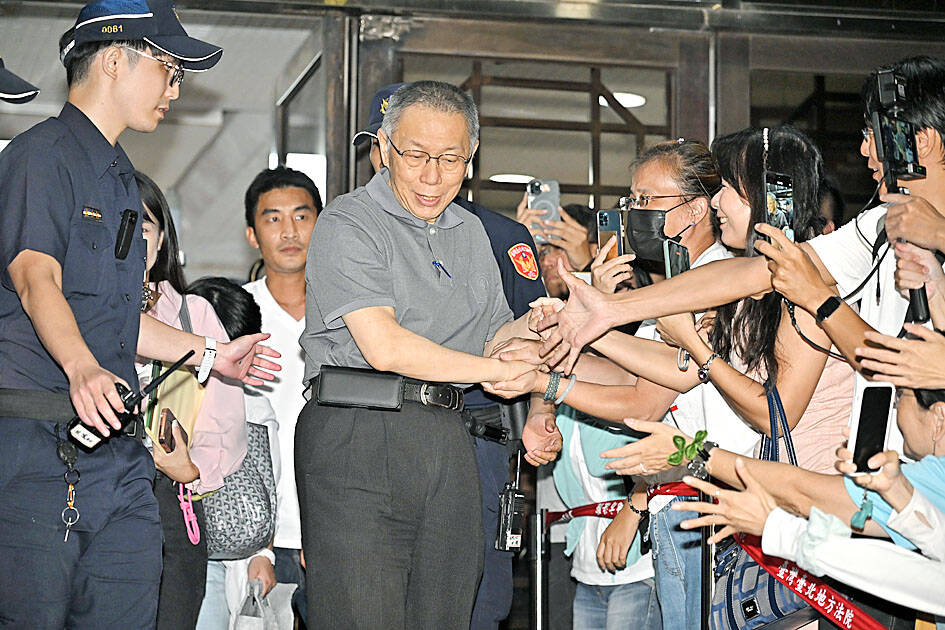The Taipei District Court yesterday again approved bail for former Taipei mayor Ko Wen-je (柯文哲) and Taipei City Councilor Angela Ying (應曉薇), keeping their original bails of NT$70 million and NT$40 million (US$2.32 million and US$1.32 million) respectively.
The ruling follows a decision by the High Court on Friday last week to overturn an earlier district court order granting bail to Ko and Ying on the condition that they wear electronic tracking devices and remain in Taiwan.
They were also barred from contacting, harassing, threatening or asking for information from other defendants or witnesses in the case.

Photo: Tu Chien-jung, Taipei Times
Ko, who had been detained incommunicado since September last year until Monday last week, when he was released on NT$70 million bail, maintains that he is innocent and that the corruption charges against him are politically motivated.
Ying, who has been indicted in connection with Ko’s case, was released on bail on Sept. 5.
The Taipei District Prosecutors’ Office appealed the bail orders on Tuesday last week, arguing that key witnesses had not yet completed their testimony and that Ko had contacted witnesses Chen Chih-han (陳智菡) and Chen You-cheng (陳宥丞) after posting bail.
The High Court found the prosecutors’ appeal justified, revoked the earlier bail ruling and returned the case for a new decision.
Ko and Ying are on trial for corruption and other offenses, in what is known locally as the “Core Pacific City case.”
Ko faces a potential sentence of 28-and-a-half years for allegedly accepting bribes of NT$17.1 million in a property development deal during his tenure as Taipei mayor and embezzling political donations during his presidential campaign last year as leader of the Taiwan People’s Party.
In its ruling yesterday, the district court said that while some witnesses have yet to appear in court, they have testified under oath during the investigation and defense attorneys did not dispute that the testimony would be admissible as evidence during the trial.
The district court said the existing court documents will allow prosecutors and defendants' lawyers to make their cases at the upcoming hearings, and it therefore decided to once again grant Ko and Ying bail and impose restrictions on their movements.
In addition, the court said, the large amount of bail set will impose psychological pressure and restrictions on Ko and Ying that will serve as a substitute to detention to ensure that the upcoming hearings proceed smoothly.
Prosecutors said they will await the official court document on yesterday's ruling to study whether or not to appeal the latest lower court ruling.
In response to the district court ruling, the TPP said that based on the principle of presumption of innocence, Ko's constitutionally protected personal freedom and freedom of communication should not be restricted.
The TPP said that as Ko has been suffering physically and mentally, the party will continue to give support him through the legal process and stand by him and his family to defend his innocence.

CHAOS: Iranians took to the streets playing celebratory music after reports of Khamenei’s death on Saturday, while mourners also gathered in Tehran yesterday Iranian Supreme Leader Ayatollah Ali Khamenei was killed in a major attack on Iran launched by Israel and the US, throwing the future of the Islamic republic into doubt and raising the risk of regional instability. Iranian state television and the state-run IRNA news agency announced the 86-year-old’s death early yesterday. US President Donald Trump said it gave Iranians their “greatest chance” to “take back” their country. The announcements came after a joint US and Israeli aerial bombardment that targeted Iranian military and governmental sites. Trump said the “heavy and pinpoint bombing” would continue through the week or as long

TRUST: The KMT said it respected the US’ timing and considerations, and hoped it would continue to honor its commitments to helping Taiwan bolster its defenses and deterrence US President Donald Trump is delaying a multibillion-dollar arms sale to Taiwan to ensure his visit to Beijing is successful, a New York Times report said. The weapons sales package has stalled in the US Department of State, the report said, citing US officials it did not identify. The White House has told agencies not to push forward ahead of Trump’s meeting with Chinese President Xi Jinping (習近平), it said. The two last month held a phone call to discuss trade and geopolitical flashpoints ahead of the summit. Xi raised the Taiwan issue and urged the US to handle arms sales to

BIG SPENDERS: Foreign investors bought the most Taiwan equities since 2005, signaling confidence that an AI boom would continue to benefit chipmakers Taiwan Semiconductor Manufacturing Co’s (TSMC, 台積電) market capitalization swelled to US$2 trillion for the first time following a 4.25 percent rally in its American depositary receipts (ADR) overnight, putting the world’s biggest contract chipmaker sixth on the list of the world’s biggest companies by market capitalization, just behind Amazon.com Inc. The site CompaniesMarketcap.com ranked TSMC ahead of Saudi Aramco and Meta Platforms Inc. The Taiwanese company’s ADRs on Tuesday surged to US$385.75 on the New York Stock Exchange, as strong demand for artificial intelligence (AI) applications led to chip supply constraints and boost revenue growth to record-breaking levels. Each TSMC ADR represents

Pro-democracy media tycoon Jimmy Lai’s (黎智英) fraud conviction and prison sentence were yesterday overturned by a Hong Kong court, in a surprise legal decision that comes soon after Lai was jailed for 20 years on a separate national security charge. Judges Jeremy Poon (潘兆初), Anthea Pang (彭寶琴) and Derek Pang (彭偉昌) said in the judgement that they allowed the appeal from Lai, and another defendant in the case, to proceed, as a lower court judge had “erred.” “The Court of Appeal gave them leave to appeal against their conviction, allowed their appeals, quashed the convictions and set aside the sentences,” the judges